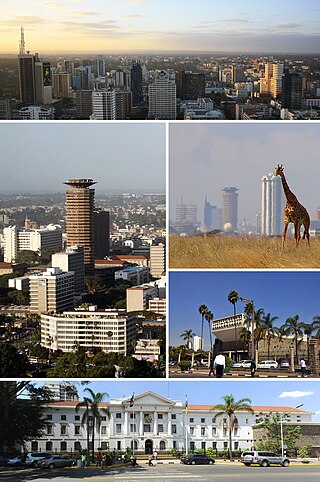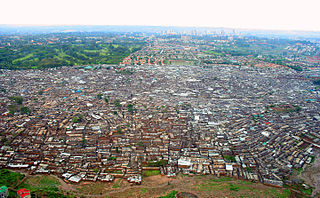
Nairobi is the capital and largest city of Kenya. The name is derived from the Maasai phrase Enkare Nairobi, which translates to 'place of cool waters', a reference to the Nairobi River which flows through the city. The city proper had a population of 4,397,073 in the 2019 census. The city is commonly referred to as The Green City in the Sun.

Kibera is a division and neighbourhood of Nairobi, Kenya, 6.6 kilometres (4.1 mi) from the city centre. Kibera is the largest slum in Nairobi, and the largest urban slum in Africa. The 2009 Kenya Population and Housing Census reports Kibera's population as 170,070, contrary to previous estimates of one or two million people. Other sources suggest the total Kibera population may be 500,000 to well over 1,000,000 depending on which slums are included in defining Kibera.

John Burdette Gage is a retired computer scientist and technology executive. He was the 21st employee of Sun Microsystems, where he is credited with creating the phrase The Network is the Computer. He served as Sun's vice president and chief researcher and director of the Science Office, until leaving on June 9, 2008, to join Kleiner Perkins Caufield & Byers as a partner to work on green technologies for global warming; he departed KPCB in 2010 to apply what he had learned "to broader issues in other parts of the world".

Community Support Group (CSG) is a national community-based organization working in three areas of Kenya: Kibera, Kisumu and Ugenya. CSG’s primary goal is to promote community development through pooling resources of community members.

Mathare is a collection of slums in Nairobi with a population of approximately 500,000 people; the population of Mathare Valley alone, the oldest of the slums that make up Mathare, is 180,000 people. Mathare is the home of football teams Mathare United and Real Mathare of the MYSA. Mathare is currently part of two electoral constituencies; the titular Mathare Constituency and the northern part being in Ruaraka Constituency. The northern part was initially part of Kasarani Constituency up to the 2013 elections when Kasarani was split into three electoral constituencies; Ruaraka being among them. The southern part was domiciled in Starehe Constituency.

A flying toilet is a facetious name for a plastic bag that is used as a simple collection device for human faeces when there is a lack of proper toilets and people are forced to practise open defecation. The filled and tied plastic bags are then discarded in ditches or on the roadside. Associated especially with slums, they are called flying toilets "because when you have filled them, you throw them as far away as you can".
Kibera Kid is a short film set in the Kibera slums in Nairobi, Kenya. It was written, directed and co-produced by Nathan Collett in collaboration with the locals of Kibera.

Nathan Collett is a filmmaker based in Nairobi, Kenya.

Hot Sun Foundation is a non-profit organization that works in Nairobi, Kenya with young people from urban slums and other marginalized communities of East Africa to train and expose their talents and potential on the world stage. Hot Sun Foundation trains youth in all aspects of filmmaking, from scriptwriting, camera, sound, pre production, budgeting, production, directing, editing, and marketing. Vision of Hot Sun Foundation: Social transformation through art and media Mission of Hot Sun Foundation: Identify and develop youth talent to tell their stories on film

The cinema of Kenya refers to the film industry of Kenya. Although a very small industry by western comparison, Kenya has produced or been a location for film since the early 1950s when Men Against the Sun was filmed in 1952. Although, in the United States, jungle epics that were set in the country were shot in Hollywood as early as the 1940s.

Mercy Murugi is a noted Kenyan film producer and production manager who has worked on a number of local and international projects including Worse Than War, Stranded with Cash Peters. She has worked with National Geographic, Discovery Channel, BBC, among other global production houses and TV channels. Her most recent project is a feature film called Togetherness Supreme, shot on the Red One camera and filmed in Kibera. Murugi is currently a producer at Page83 films.
Mary Beth Fielder is an American writer, director and producer of television and feature films. She served on the faculty of the University of Southern California School of Cinematic Arts from 1994 to 2009.
Joel Bergner is an American muralist, street artist, and educator who creates large-scale works of art with the participation of young people and communities around the world. Bergner is the co-founder and co-director of the non-profit organization Artolution, which organizes community-based public art initiatives with those who have experienced armed conflict, trauma and social marginalization. He has led such projects with incarcerated teenagers, Syrian refugees, youth from slum areas, the mentally and physically disabled, young people with substance abuse issues, orphans and street children.
Togetherness Supreme is a 2010 Kenyan film.
ICS SP is a civil society organization. ICS Africa was founded in 1980 and aimed to ensure the safety and wellbeing of all children in Africa. They moved their headquarters to Nunspeet in 2004, while renaming from "International Christian Support Fund" to "International Child Support". The word 'Christian' implied that ICS only supported Christians, conflicting with ICS' goal of supporting underprivileged people regardless of belief. They changed their logo and name to "Investing in Children and their Societies" in 2011.
Shining Hope for Communities (SHOFCO) is a grassroots movement based in Nairobi, Kenya in urban slums providing services, community advocacy platforms, and education and leadership development for women and girls. SHOFCO serves more than 350,000 urban slum dwellers in 10 slums across three cities in Kenya.
Kennedy Odede is a Kenyan social entrepreneur and author. Odede is the co-founder and CEO of Shining Hope for Communities (SHOFCO), a movement based in Nairobi, Kenya, and New York, USA.

Tunapanda Institute is a United States based non-profit organization operating in East Africa. With the goal of training disadvantaged young people, various free courses in technology, design and entrepreneurship are offered to increase the chance of graduates in the labour market. The majority of its work is based in Kibera, a slum in Nairobi, but it has also operated in other parts of Kenya, Tanzania, and Uganda.

The Uweza Foundation is a non-profit organization which works to promote human development in the Kibera slum of Nairobi, Kenya. It was founded in 2008 and is registered in the United States as a 501(c)3 organization. It is led by actress Rooney Mara.










